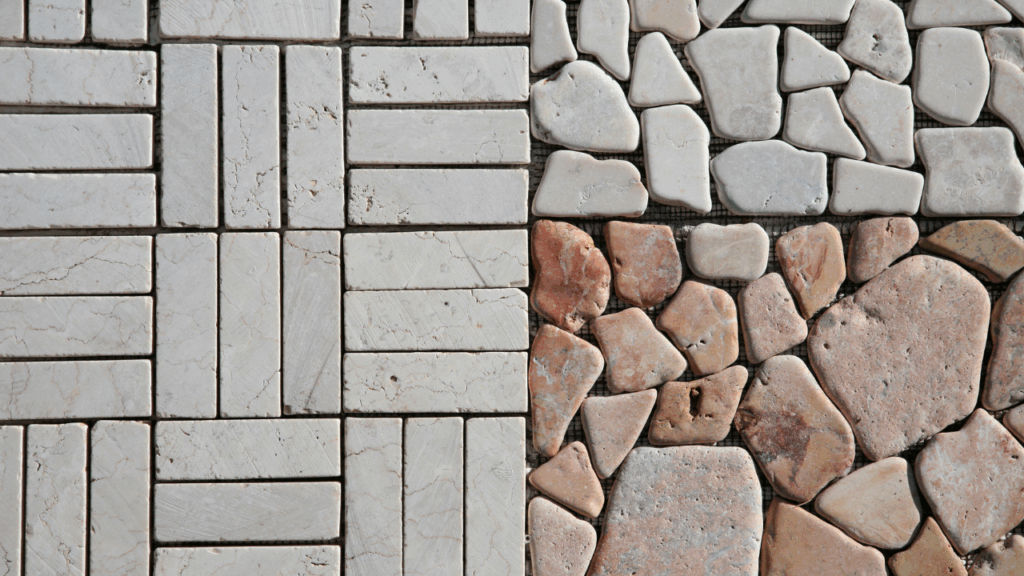
If you’re in the midst of planning your next renovation or construction project, choosing sustainable tile options can really help reduce your project’s environmental impact while creating beautiful, lasting spaces. Natural stone tiles are one of the best eco-friendly flooring choices available, providing impressive environmental benefits that go beyond their lovely appearance.
The Environmental Advantages of Natural Stone Tiles
Natural stone is the ultimate sustainable building material, as it needs much less processing than manufactured options. Unlike synthetic materials that are produced through energy-heavy processes, natural stone is extracted directly from the earth using straightforward extraction techniques, resulting in a much lower carbon footprint.
A study from the Institute for Materials in Construction at the University of Stuttgart has shown that natural stone floor coverings are much kinder to the environment and our wallets compared to ceramics, carpets, PVC, laminates, and parquet. It turns out that natural stone tiles have an ecological impact that’s roughly 84% lower than large ceramic tiles and 27% lower than terrazzo tiles.
Durability That Defines True Sustainability
One of the best things about natural stone floors is their impressive lifespan, which makes them a great eco-conscious flooring choice. While synthetic materials might wear out and need replacing every few years, natural stone can last for generations with the right care, helping to cut down on waste and save resources.
Natural stone’s impressive durability is a product of its formation over millions of years, leading to materials that are incredibly strong and resilient. Just look at the historic stone landmarks; they’ve lasted for centuries, showcasing not only their ability to withstand the test of time but also their enduring beauty and structural integrity.
Zero Emissions and Healthier Indoor Environments
One of the standout benefits of natural stone tiles is their positive impact on indoor air quality. They are entirely free from volatile organic compounds (VOCs), making them the only cladding materials that don’t emit harmful gases. This is especially important for families with allergies or sensitivities, as poor indoor air quality can lead to various health issues, like headaches, chronic fatigue, and respiratory problems.
Additionally, natural stone’s fire-resistant properties mean it won’t release toxic fumes when exposed to high temperatures, further contributing to safer indoor environments. These materials require no interior finishing or secondary coatings, eliminating additional sources of potential chemical emissions.
Energy Efficiency Through Thermal Mass
Thanks to its excellent thermal mass properties, natural stone plays a big role in improving energy efficiency in buildings. It can absorb, store, and gradually release heat, which helps maintain comfortable indoor temperatures and lessens the need for heating and cooling systems.
In the summer, stone surfaces take in a lot of heat during the day and then let it out slowly at night, which keeps your home cosy. When it gets colder, the process reverses: the stones store heat from your heating system or the sun and release it gradually to keep the space warm. This natural temperature control can really cut down on energy costs and lower bills.
Sustainable Stone Sourcing and Production
Modern quarrying practices have really come a long way, focusing on sustainability in every aspect. Today, responsible stone quarrying includes careful site selection to protect fragile ecosystems, setting up water recycling systems, and detailed plans for land rehabilitation.
Many quarries are now tapping into renewable energy sources like solar and wind power to help reduce their carbon footprint. Water recycling is key here, with closed-loop systems making a big difference in water consumption during processing. On top of that, efforts to minimise waste include finding new uses for stone offcuts, turning them into products like mosaic tiles and aggregate. This way, they’re getting the most out of each stone block while keeping landfill waste to a minimum.
Natural Stone vs Ceramic Tiles Sustainability
When it comes to sustainability, natural stone floor tiles are a more eco-friendly choice than ceramic tiles. Producing ceramic tiles requires high-temperature firing, which uses a lot of energy and creates more emissions, plus it relies on mining large amounts of clay and other non-renewable materials. In contrast, natural stone tiles are simply quarried and cut, a process that uses much less energy and results in a much lower carbon footprint. This makes natural stone a greener option for anyone looking for environmentally friendly tiles.
The Recyclability Factor
Natural stone is 100% recyclable, which means it can be reused over and over again without any loss in quality. When stone installations reach the end of their life, they can be crushed into aggregates for new construction or used in different ways. This complete recyclability means that natural stone ends up as permanent waste, which is a big win for the circular economy.
Choosing Natural Stone Floors for Your Project
The beauty of natural stone lies in its incredible versatility, making it perfect for a wide range of uses, from residential kitchens and bathrooms to busy commercial spaces that see a lot of action. Whether you’re after a touch of classic elegance or a sleek, modern vibe, natural stone offers a timeless charm that never goes out of style.
If you’re a homeowner or builder in Australia, opting for sustainable building materials like natural stone is an excellent way to support growing environmental awareness while meeting strict building regulations. Natural stone offers a unique combination of aesthetic appeal, exceptional durability, and eco-friendly benefits, making it a smart investment for your property and a positive choice for the planet’s future.
Transform Your Space Sustainably
Excited to check out eco-friendly tile options for your next project? At Stone3, we’re all about providing Brisbane with the finest selection of natural stone tiles that combine beauty, durability, and environmental responsibility. Our experienced team is here to help you find a sustainable stone flooring solution that meets your unique needs. Contact Stone3 today, your partner in green building materials.

